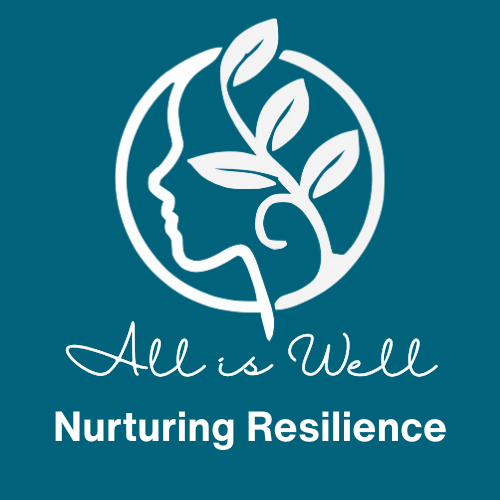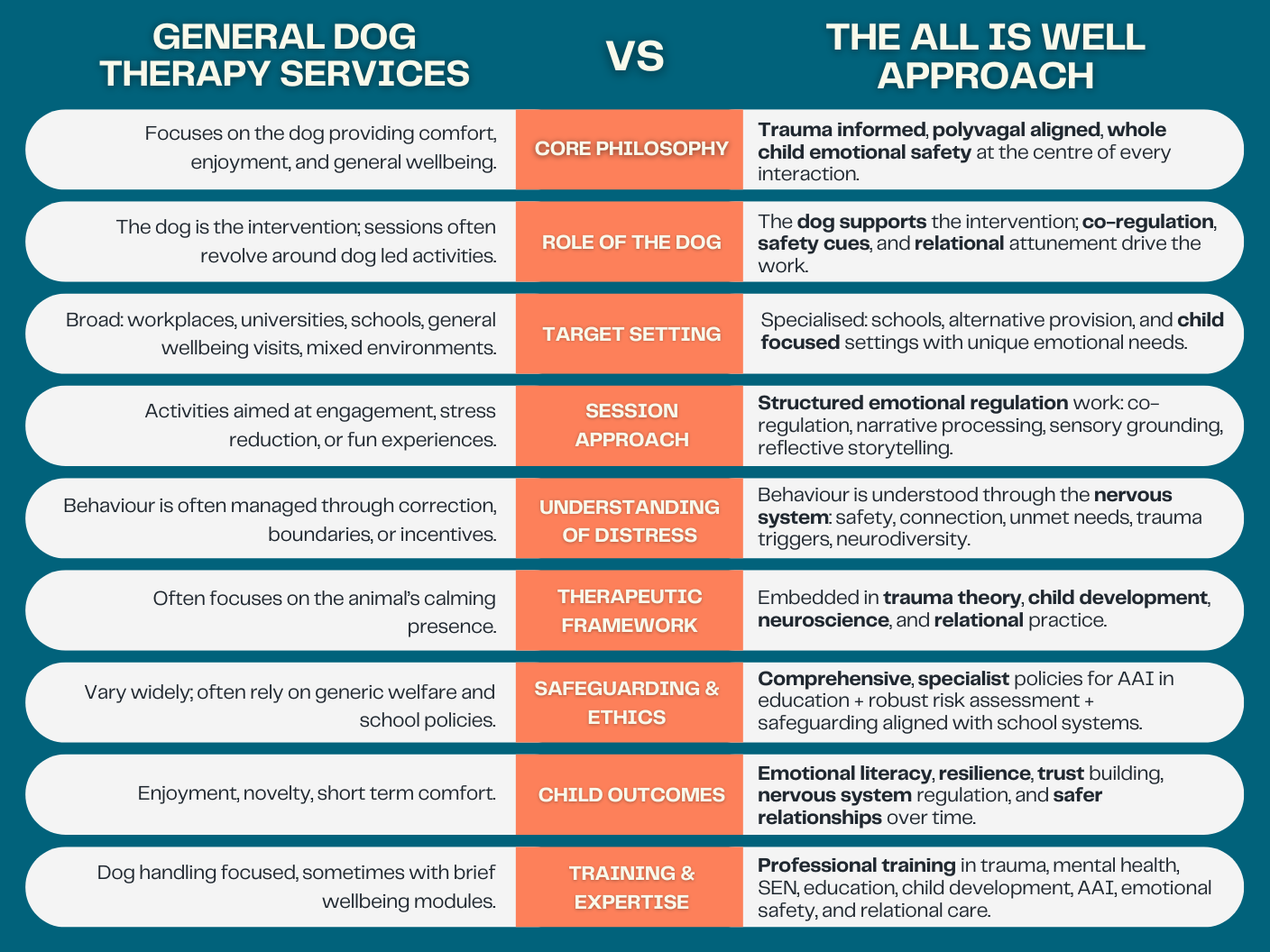The Science Behind Feeling Safe and Supported
Our Approach
Trauma Informed / Polyvagal Aligned / Child Centred
Real change only happens when a child’s nervous system feels “safe enough to soften,” and our work is always grounded in that safety.
At the All Is Well Approach, our therapy dog work isn’t just “a nice visit with a dog.” It’s a structured, emotionally intelligent intervention for children who need more than comfort or distraction.
Lola and I support schools and child focused communities across Warrington, Widnes, Liverpool, and the North West — helping children and young people rebuild trust, regulate their nervous system, and feel genuinely safe in their world again.
What is Trauma Informed Care?
Trauma Informed care means recognising that many children, and the adults who support them, may have experienced stressful or challenging events that affect how they feel, think, and behave. Instead of judging behaviour, we see it as a form of communication: a way of expressing unmet needs, past experiences, or emotional distress.
At the All Is Well Approach, we apply Trauma Informed principles in schools, therapy sessions, and support programmes, helping children feel safe, understood, and ready to learn. By responding with empathy, patience, and practical strategies, we promote emotional safety, wellbeing, and connection across the whole community — from classrooms and homes to support organisations and beyond.
Research shows that Trauma Informed approaches can reduce stress responses, support emotional regulation, improve engagement, and enhance learning outcomes for children. Integrating these principles into everyday practice helps create environments where children can thrive, staff feel supported, and relationships are strengthened.
What is Polyvagal Theory?
Polyvagal Theory is a science backed framework that explains how the nervous system responds to stress, safety, and emotional experiences in both children and adults. It helps us understand why we might feel anxious, shut down, overwhelmed, or disconnected — showing that these reactions are our body’s way of trying to keep us safe.
At the All Is Well Approach, we use Polyvagal Theory to guide our work in schools and therapy sessions. By recognising how the nervous system reacts to stress and connection, we can create environments where children feel safe, calm, and supported. This approach helps children regulate their emotions, build confidence, and engage more fully in learning, while also supporting the wellbeing of staff and adults who care for them.
Research shows that interventions informed by Polyvagal Theory can improve emotional regulation, reduce stress responses, and strengthen social connection. Applying these principles across classrooms, therapy sessions, and whole-school practices helps build resilience, curiosity, and meaningful relationships.
The Benefits of Therapy Dogs
Therapy dogs, like Lola from the All Is Well Approach, offer a unique and powerful form of emotional support. Their calm, non-judgmental presence helps reduce anxiety, lower stress hormones such as cortisol, and promote feelings of safety, connection, and wellbeing. Research shows that interacting with a Therapy Dog can slow breathing and heart rate, activating the parasympathetic nervous system — the branch responsible for rest, relaxation, and healing.
In schools and educational settings, Therapy Dogs encourage social engagement, support emotional regulation, and build trust, particularly for children who have experienced trauma or face emotional challenges. At the All Is Well Approach, we combine Animal Assisted Interventions with Trauma Informed practice, creating a holistic approach that nurtures both mind and body. This supports resilience, confidence, and wellbeing for children, as well as the staff and adults who care for them.
Scientific evidence and practical experience confirm that Therapy Dogs can enhance learning environments, improve focus, and build meaningful relationships. By integrating these interventions thoughtfully, schools can provide children with safe, supportive spaces to grow emotionally, socially, and academically.
How Lola Supports Co-Regulation:
Lola isn’t the intervention - she supports it. Her role is to:
Offer grounding, rhythmic sensory input
Cue safety through soft eye contact, slowing, leaning in, or resting
Anchor the child in moments of overwhelm
Provide a steady, dependable presence that builds trust
Help children practise regulation with a living, breathing partner
Children often find it easier to try new emotional skills beside a calm dog than with an adult alone.
And when Lola’s presence softens the edges, we can gently move into reflective conversation, storytelling, problem sizing, and emotional literacy work.
How All Is Well Approach Differs From Typical Therapy Dog Providers
Every therapy dog service provides value, but not every service is built around children’s nervous systems, trauma histories, and school realities. At the All Is Well Approach, Animal Assisted Intervention (AAI) isn’t a stand alone activity. It is embedded in a trauma informed, polyvagal aligned, whole child approach that prioritises emotional safety first. Below is a clear comparison showing how our AAI practice differs from general dog therapy providers.
Key Features of the All Is Well Approach:
Core Philosophy: Our sessions centre on trauma informed practice and the child’s emotional safety, not just the dog’s presence.
Role of the Dog: The dog supports co-regulation, safety cues, and relational attunement.
Target Settings: Specialised for schools, alternative provision, and child focused environments.
Session Approach: Structured emotional regulation work including co-regulation, narrative processing, and reflective storytelling.
Understanding Distress: Behaviour is understood through nervous system theory, trauma triggers, and neurodiversity, rather than correction or incentives.
Safeguarding & Ethics: Comprehensive policies and risk assessment aligned with school systems.
Child Outcomes: Builds resilience, trust, emotional literacy, and safer relationships over time.
Training & Expertise: Practitioner training in trauma, SEN, mental health, education, AAI, and relational care.
Many children cannot be soothed simply because a dog is present, especially those with trauma histories, anxiety, sensory needs, or dysregulated nervous systems. They need predictable safety, emotional attunement, co-regulation, and a practitioner who understands the physiology of distress.
The All Is Well Approach ensures the dog supports the child’s sense of safety, allowing children to feel safe enough to soften and grow.
Comparison table showing the All Is Well Approach trauma informed dog therapy service versus general dog therapy providers, highlighting emotional safety, co-regulation, and child outcomes.





